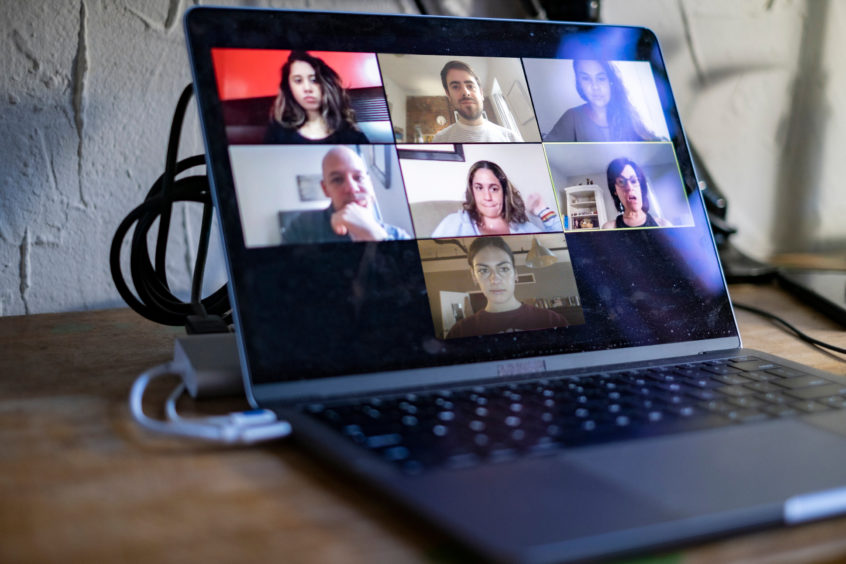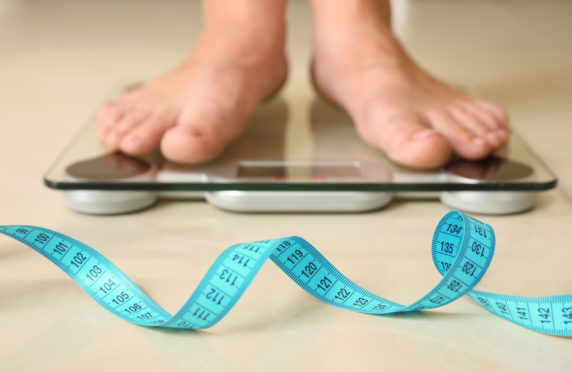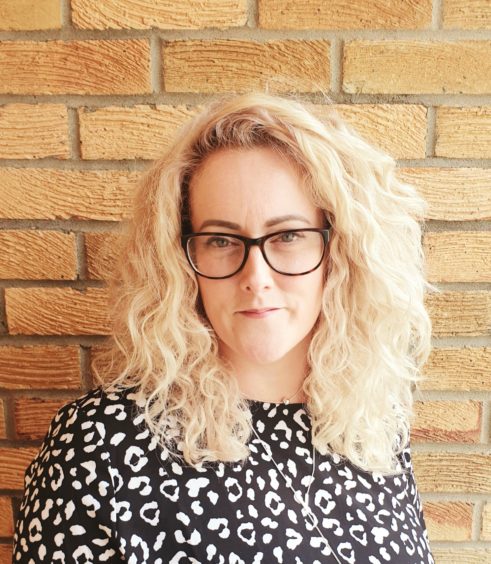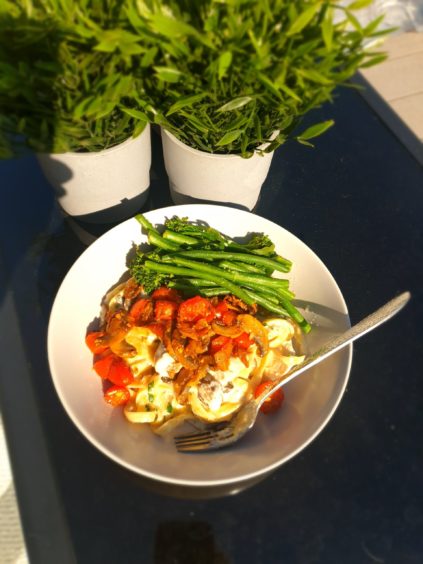A Scottish dietitian and a Slimming World consultant talk us through lockdown eating habits and and what we can do to keep our weight healthy.
When talking about food, the discussion often turns to weight – and it can be a loaded topic, with many people unhappy about the numbers on their scales, whether they’re low or high.
For some, lockdown has exacerbated existing issues with food and mental health, as well as creating new problems related to weight as eating habits have changed in these unprecedented times.
A recent study by King’s College London and Ipsos MORI surveyed 2,254 people, with 48% of respondents saying they have put on weight during lockdown, the same percentage reporting feeling more anxious or depressed than usual, and 29% saying they have drunk more alcohol.
Clearly, many of us are reaching for the snacks and into the alcohol cabinet for comfort as we spend more time at home. But we’re also taking action to counter this, with Slimming World, which runs groups in the north of Scotland, Tayside and Fife, seeing an increase in the numbers of people signing up for its online slimming classes during lockdown. In the past two weeks, 10,000 across the UK have become new members.
Meanwhile dietitian Lorraine McCready, founder of weight management service Diet Scotland, is on hand to explain how and why our habits have changed during lockdown, and what we can do to keep our weight at a healthy level.
“People gain and lose weight all the time, and during lockdown we’ve been seeing a real mixture of habits,” she said.
“Some people that might be on a 12 week lockdown wouldn’t necessarily have the ability to get the food they want and may find that they’re stuck in a rut. They might start nibbling and snacking out of boredom.
“On the other hand I’m seeing a lot more people out walking and exercising, including people who wouldn’t have done this before lockdown. Also, if you look at the food items that sold out at the start of lockdown, it was things like pasta, flour and yeast, which are used for cooking from scratch.
“These things were sold out for quite a while, so clearly people’s behaviour was changing and so was their belief in what they can do in terms of cooking. There has also been a rise in sales of organic produce and an increasing awareness of what is healthy as people look for foods that can boost their immunity.”
Lorraine explained that different people react differently to adversity and stress, with some people seeing it as a challenge while others become insular and fall into unhealthy habits.

She added that although weight gain can become a problem if it’s chronic, we shouldn’t obsess over a few extra pounds gained during lockdown.
“Weight gain is a problem when it becomes morbid obesity and is linked with health problems,” she said.
“In the context of Covid-19, it could be dangerous if the person has diabetes and we also know that lung function is impaired, because the heavier you are the more limited your lung expansion is due to the pressure on your chest if you’re carrying a lot of weight.
“If people just put on a few extra pounds during lockdown, I don’t think that in itself is worrying because when life goes back to normal they will probably shed that and it’s unlikely to have an effect on their health.
“However, people should be careful that lockdown habits don’t become ingrained, because we don’t know how long all this will go on for. Extra biscuits every day or an extra carry out meal per week over a long period of time will have an effect, so we do need to watch our long term habits.
Weight gain is a problem when it becomes morbid obesity and is linked with health problems. In the context of Covid-19, it could be dangerous if the person has diabetes and we also know that lung function is impaired.
Lorraine McCready, dietitian
“I think things could have been much worse if we had had bad weather during lockdown, as people would have stayed in and snacked a lot more, and gone out to exercise less. The sunny weather we’ve been having has definitely stopped people’s health from getting worse than it would’ve been otherwise”.
Lorraine explained that snacking is one of the biggest culprits when it comes to weight gain and that simply reducing or stopping this altogether can make a big difference.
Reducing portion sizes and keeping a food diary to track our habits and notice what makes a positive difference are also good habits to get into.
“People say to me, ‘But I’ll be hungry’ and I say, ‘Well, what’s wrong with that?’”, she added.
“There should be short periods in the day when we feel hunger, between each meal. Our society is in the habit of constantly snacking, when actually we should allow ourselves to get hungry so that we enjoy each meal.”
Sarah Dougan, a Slimming World consultant who runs five groups in the area between Turriff and Elgin, said that the best way to keep weight down is not through cutting out food groups but getting the ratio right between healthy foods and higher calorie treats.
“We encourage people to eat normal food and nothing is off limits,” she said.
“We talk about ‘free foods’ a lot – these are foods that you can eat freely and still lose weight, such as fruit, vegetables, rice, eggs and fish. They are filling foods, yet low in calories. You can have enough to satisfy your appetite, there are no specific portion sizes that we give people.
“As a guide, on your plate it’s good to have one third protein, one third pasta or rice and the rest can be vegetables.
“Then you have what we call ‘sins’. These are high-calorie, high-sugar, high-fat foods. You’re allowed 15 sins a day on average, although it depends on your height and weight. On our website we have a sin calculator, which tells you how many sins a food contains – a bag of crisps is seven sins, for example.
“The thing to remember is that many people are struggling during lockdown. People are struggling with the changes and are out of their normal routine. Sometimes they’re not finding the things they normally eat in the shops, they’re at home more so possibly going to the fridge more often or having more alcohol than they normally would, if they don’t have to be up in the morning.
“Now we’re at the stage where people are realising they may have fallen into unhealthy habits and we’re getting more people signing up to the classes. We’re running our groups on Zoom and at first uptake was slow, but last week we had 14 new members. We usually have a similar spike in numbers just after New Year, ahead of summer and during the autumn school holidays when people are looking ahead to Christmas parties.
“A lot of people are now looking ahead to getting out of lockdown. The Zoom classes have been successful, we do our usual things – weigh-ins, then a chat about how we’ve been doing, how we can change out habits and plans for healthy foods that we like.”
Slimming World recommends following these top tips for a healthy lockdown…
Fall in love with food
It’s so easy to get stuck in a bit of a rut when it comes to cooking. Do you find yourself making the same handful of meals on repeat every week? If so, you could take this time to try something new. It doesn’t have to be too complicated or time consuming – just something that makes you feel excited about cooking again.
Stay in touch
It’s easy to feel isolated during lockdown. Staying connected is now more important than ever, and not just for your weight loss. Sometimes you just need a laugh with your mates to lift your spirits.

Video calls are, of course, hugely popular during lockdown – things like scheduling a date with your mates and coming together online to replace that monthly night out, or booking a family quiz night and testing your loved ones’ general knowledge.
Take control
There’s a lot happening in the world that we can’t control, but actually looking after ourselves is something we can control. As well as staying on track with any healthy eating plans or keeping up with your regular activity, it’s important to schedule in some ‘me’ time too. Run a hot bubble bath and give yourself a pamper, pop on your favourite podcast or settle down with a book or magazine.
Get active
Your usual gym might be closed but there are still plenty of ways to get active in lockdown, if you’d like to. There are loads of online classes you can try out – from HIIT to salsa-cize. Current guidelines also suggest we can get out limitlessly in our local area to be physically active, so fit in a daily walk if you can, or set yourself a challenge like completing Couch to 5K.
Soothe your mind
In these challenging times, people will be feeling more worried and anxious than usual, and these feelings could have an impact on us making healthy choices and see us turn to food for comfort. Focusing on the present moment – mindfulness – to calm your mind in times of uncertainty can be really helpful. Colouring books, jigsaws and word puzzles are useful activities for this.



